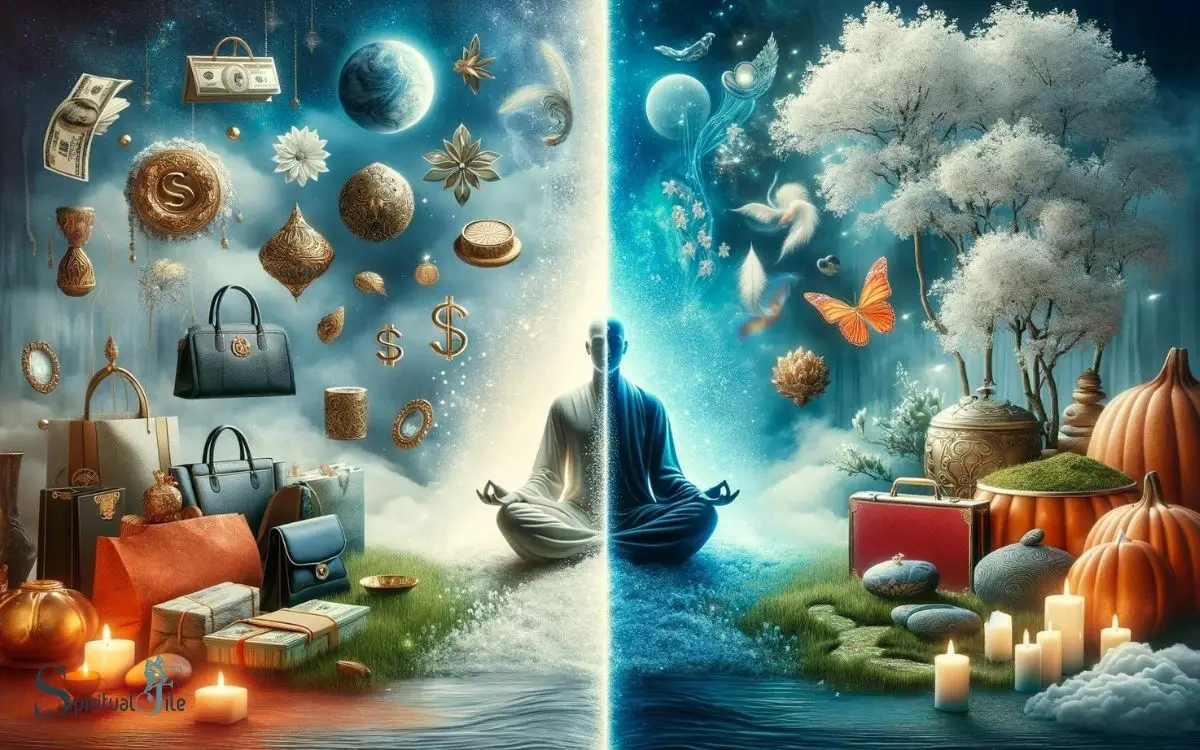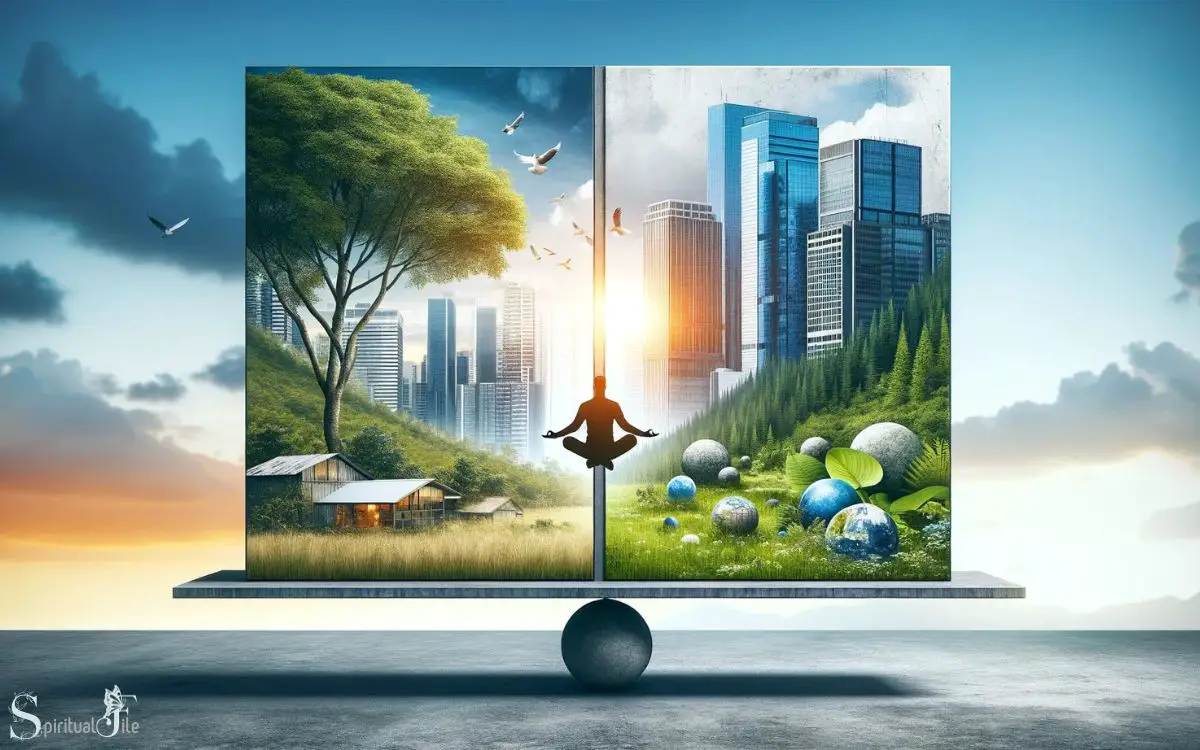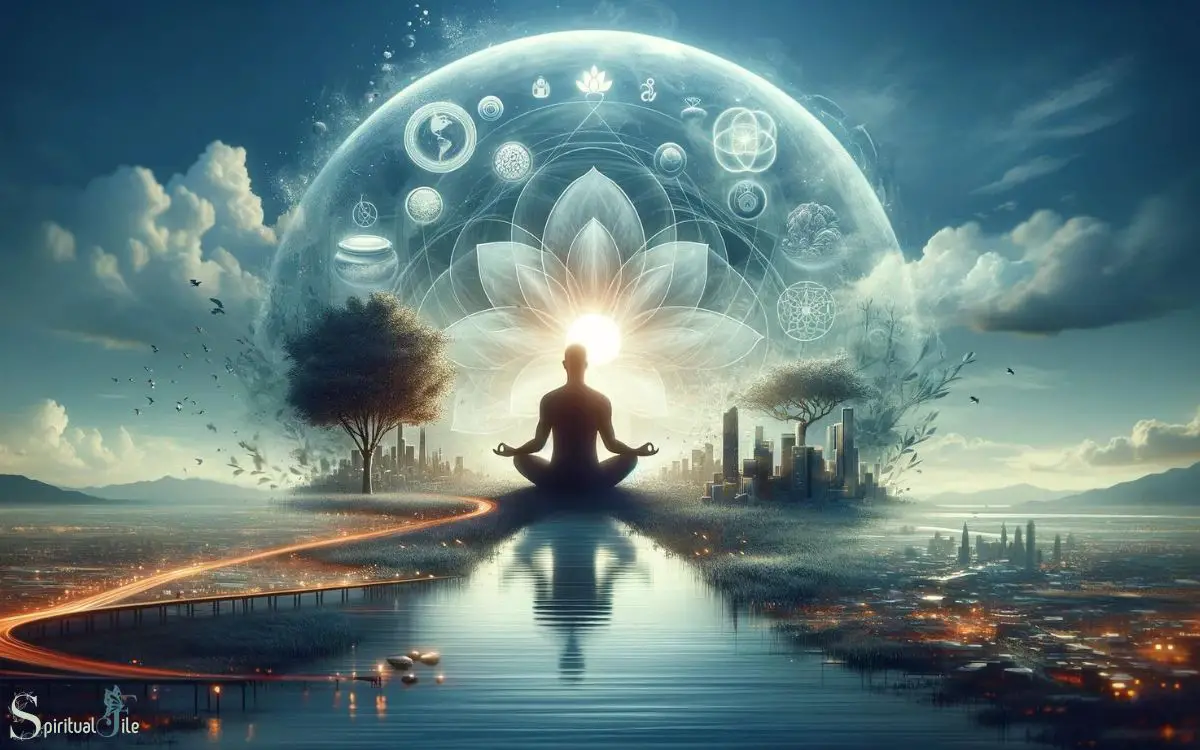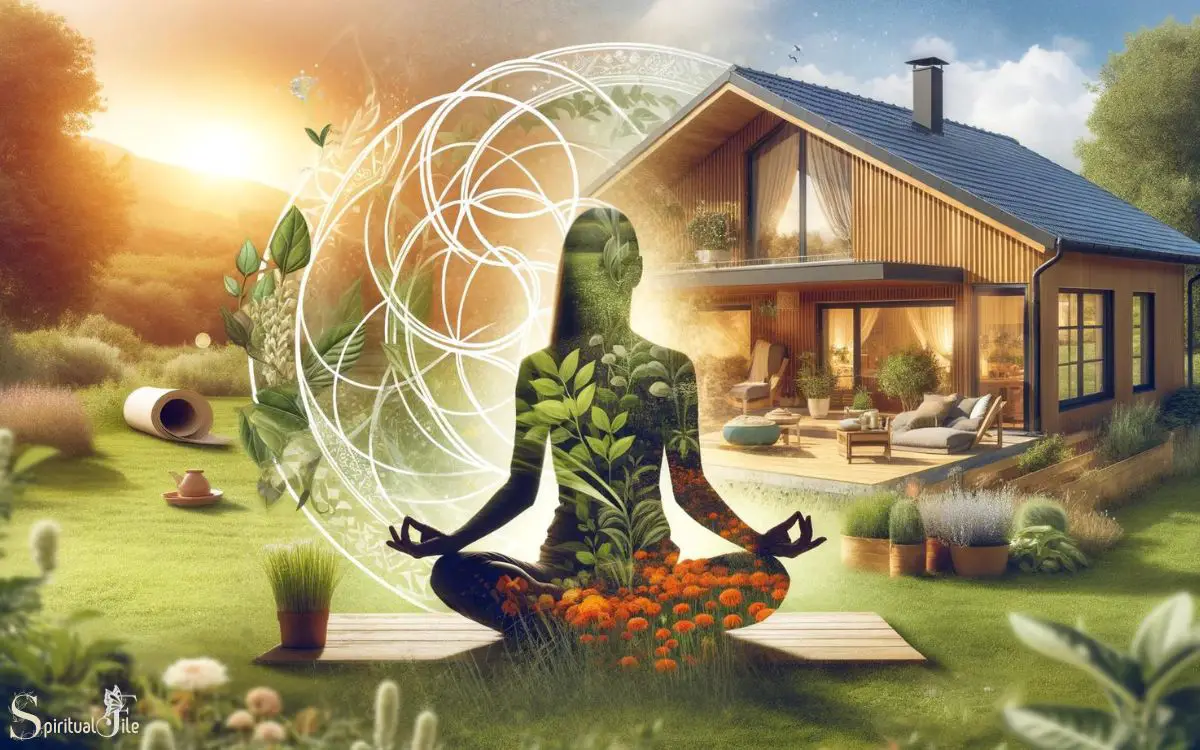Material Things Vs Spiritual Things: Gadgets!
Material things are tangible objects that we can see, touch, and own, such as cars, gadgets, and clothes; they often provide temporary satisfaction and are associated with one’s social status and physical comfort.
Spiritual things, on the other hand, are intangible elements that embody our beliefs, values, emotions, and consciousness, offering deep, lasting fulfillment and a sense of purpose in life.
In contrasting material and spiritual things, it’s important to recognize the different roles they play in our lives. Material things are external, providing immediate gratification and are often used to measure success in societal terms.
They can be important for survival and comfort, but their value may diminish over time, and their pursuit can sometimes lead to a never-ending cycle of desire and consumption.
Material Things:
- Tangible
- Provide comfort and convenience
- Can lead to a focus on consumerism
- Value may depreciate over time
Spiritual Things:
- Intangible
- Offer lasting fulfillment
- Focused on inner growth and relationships
- Value is enduring and grows with personal development
While material possessions can make life more enjoyable, true happiness and contentment often stem from spiritual fulfillment that transcends the physical realm.

Key Takeaway
The Influence of Material Possessions

The influence of material possessions on my life has been profound and has shaped my values and priorities.
Growing up, I often equated material wealth with success and happiness. Possessions seemed to define one’s worth in society.
However, as I matured, I came to realize that the value of material things pales in comparison to the richness of experiences and relationships.
I learned that the pursuit of material possessions can lead to a shallow and unfulfilling existence. It’s the intangible aspects of life, such as love, kindness, and personal growth, that truly bring meaning and contentment.
This realization has shifted my focus towards cultivating a more minimalist and purposeful lifestyle, where the emphasis lies on the spiritual and emotional fulfillment rather than the accumulation of material wealth.
The Quest for Spiritual Fulfillment
As I reflect on the pursuit of spiritual fulfillment, I can’t help but ponder the contrast between materialism and inner peace.
The yearning for a meaningful life seems to be a universal human quest, transcending cultural and societal boundaries.
It’s fascinating to explore how different individuals navigate this journey and find their own paths to spiritual contentment.

Materialism and Inner Peace
Seeking inner peace can often be overshadowed by the pursuit of material wealth and possessions.
In today’s fast-paced world, it’s easy to get caught up in the allure of materialism, but I’ve come to realize that the quest for inner peace is far more fulfilling.
Here are a few thoughts to consider:
- Material possessions provide temporary satisfaction, while inner peace offers lasting contentment.
- The relentless pursuit of material wealth can lead to stress and anxiety, whereas inner peace brings about a sense of calm and tranquility.
- Materialism often fosters a constant desire for more, leading to a never-ending cycle of dissatisfaction, whereas inner peace allows us to find joy in simplicity and gratitude.
- Ultimately, the true measure of wealth lies not in material possessions, but in the richness of our inner spiritual fulfillment.
Pursuit of Meaningful Life
Striving for spiritual fulfillment often leads to a deeper sense of purpose and satisfaction in life. In today’s fast-paced and materialistic world, many of us find ourselves yearning for something more meaningful.
I’ve experienced this yearning myself, and I’ve come to realize that true fulfillment often comes from within, from nurturing our spiritual selves.
It’s about finding a sense of connection to something larger than ourselves, whether it’s through religion, meditation, or simply acts of kindness and compassion.
The pursuit of a meaningful life isn’t about accumulating possessions or wealth; it’s about cultivating love, gratitude, and inner peace. When we prioritize our spiritual well-being, we often find that our lives become richer, more purposeful, and deeply satisfying.
Balancing Material and Spiritual Priorities
I’ve often found myself pondering the delicate balance between material and spiritual priorities in life. It’s a constant juggling act, trying to find inner peace while also striving for personal growth and success.
Navigating the complexities of wealth and fulfillment can be challenging, but it’s a journey worth embarking on.

Finding Inner Peace
Often, I find myself torn between the pursuit of material wealth and the quest for spiritual fulfillment. Achieving inner peace while balancing these priorities is a constant challenge.
Here are some strategies I’ve found helpful:
- Mindfulness Practices: Engaging in meditation, deep breathing, or yoga helps me stay present and connected to my spiritual self.
- Gratitude Reflection: Taking time to appreciate the blessings in my life, both material and spiritual, shifts my focus from scarcity to abundance.
- Setting Boundaries: Establishing limits on material pursuits and dedicating specific time to spiritual growth creates a sense of balance.
- Acts of Service: Helping others selflessly reminds me of the importance of spiritual fulfillment over material gain.
Prioritizing Personal Growth
Achieving a sense of balance between material and spiritual priorities requires intentional prioritization of personal growth. It’s essential to focus on both material and spiritual aspects of life to achieve fulfillment.
Balancing these priorities involves nurturing personal development, which can be achieved through various means.
| Physical Aspect | Mental Aspect | Spiritual Aspect |
|---|---|---|
| Regular Exercise | Mindfulness | Meditation |
| Healthy Diet | Continuous Learning | Gratitude |
| Sufficient Rest | Stress Management | Acts of Kindness |
| Outdoor Activities | Positive Affirmations | Connection with Nature |
Prioritizing personal growth involves nurturing the body, mind, and spirit. By focusing on these aspects, one can achieve a sense of balance and fulfillment, allowing for a harmonious integration of material and spiritual priorities.
Balancing Wealth and Fulfillment
Balancing material and spiritual priorities requires intentional consideration of wealth and fulfillment. It’s essential to strike a harmonious balance between the two to lead a truly fulfilling life.
Here are some key points to consider:
- Evaluate Your Values: Reflect on what truly brings you joy and fulfillment. Consider whether your pursuits align with your core values and beliefs.
- Practice Gratitude: Cultivate a mindset of gratitude for both material wealth and spiritual well-being. Appreciating what you have can bring a sense of contentment and fulfillment.
- Set Clear Priorities: Determine what holds the most significance in your life. Prioritize activities and pursuits that contribute to both material wealth and spiritual fulfillment.
- Develop a Holistic Approach: Seek to integrate material and spiritual aspects into your daily life, aiming for a balanced and harmonious existence.
Consumerism’s Impact on Well-being

As I reflect on my own experiences, I have noticed that consumerism’s impact on well-being has become increasingly apparent over the past decade.
The constant barrage of advertisements and societal pressure to possess the latest gadgets or trendiest clothes has created a sense of inadequacy and perpetual desire for more.
This relentless pursuit of material possessions often leads to financial strain, anxiety, and a feeling of never being satisfied.
It’s easy to get caught up in the cycle of consumerism, constantly seeking happiness through acquiring more things. However, I’ve come to realize that true well-being comes from meaningful connections, personal growth, and experiences that enrich the soul.
By shifting our focus from material possessions to spiritual and emotional fulfillment, we can truly enhance our overall well-being and find contentment in the present moment.
Nurturing Inner Peace and Contentment
I find that nurturing inner peace and contentment requires a deliberate shift in focus from external desires to internal fulfillment. It’s a journey of self-discovery and mindfulness that brings about a deep sense of tranquility and happiness.

To nurture inner peace and contentment, I have found the following practices to be beneficial:
- Mindfulness Meditation: Engaging in regular mindfulness meditation helps in quieting the mind and being fully present in the moment.
- Gratitude Journaling: Taking time each day to write down things I am grateful for fosters a sense of appreciation and contentment.
- Serving Others: Volunteering or simply helping someone in need provides a profound sense of fulfillment and inner peace.
- Simplifying Life: Letting go of unnecessary possessions and commitments creates space for a more peaceful and content existence.
These practices have helped me in nurturing my inner peace and contentment.
Finding Meaning Beyond Materialism

In my experience, finding meaning beyond materialism has been essential for cultivating a deeper sense of fulfillment and purpose in life.
While material possessions can bring temporary satisfaction, they often leave us longing for something more substantial.
By shifting the focus from acquiring things to seeking experiences, relationships, and personal growth, I’ve discovered a richness in life that goes beyond mere possessions.
Embracing values such as compassion, gratitude, and mindfulness has allowed me to connect with the world in a more meaningful way, fostering a sense of purpose and contentment.
This shift in perspective has provided me with a deeper understanding of what truly matters, enriching my life in ways that material wealth alone could never achieve.
– Are Gadgets Considered Material Things in Different Cultural Backgrounds?
In some cultures, gadgets are seen as purely practical tools, while in others, they hold a deeper significance. For example, in traditional Japanese culture, gadgets can be considered spiritual things in culture, with a focus on simplicity and mindfulness. This contrast highlights the diverse attitudes towards technology around the world.
Cultivating a Holistic Lifestyle
Transitioning from a focus on material possessions to a holistic lifestyle has allowed me to embrace a more balanced and interconnected approach to my well-being. It’s been a transformative journey, and I’ve learned some valuable lessons along the way.

Here are a few important aspects of cultivating a holistic lifestyle:
- Mindfulness: Practicing mindfulness has helped me stay present and appreciate the beauty of each moment.
- Healthy Eating: Nourishing my body with wholesome foods has had a profound impact on my overall health and vitality.
- Physical Activity: Engaging in regular exercise not only keeps me fit but also contributes to my mental and emotional well-being.
- Spiritual Connection: Nurturing my spiritual side through meditation and reflection has brought a sense of peace and purpose to my life.
These elements have collectively enriched my life, fostering a deeper sense of fulfillment and harmony.
Conclusion
As I gaze out at the tranquil ocean, I am reminded that the waves represent the ebb and flow of material possessions in our lives. Just like the tides, our material wealth will come and go.
However, the steady, unwavering presence of the ocean itself symbolizes the enduring nature of spiritual fulfillment. It is in nurturing our inner peace and contentment that we find true abundance, beyond the fleeting allure of materialism.






